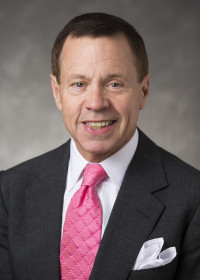
“You can effect change,” was keynote speaker David M. Darst’s take-home message to Washington State University students who attended the annual Brinson Distinguished Lecture Series in September. Darst shared insights from his multi-decade career as an independent investment consultant and former managing director and chief investment strategist of Morgan Stanley Wealth Management.
His address, “Asset Allocation and Investment Strategy for 2015 and Beyond,” focused heavily on the need for structural reform to ensure the health of financial markets. He incorporated four themes: what happened, what is happening, what may happen and what to do.
World events impacting U.S. financial prosperity
Darst presented an overview of world events – including terrorism – that have affected and continue to impact the United States’ financial prosperity. He spoke from personal experience, having survived 9/11 attacks on the World Trade Center, and used recent examples of terrorism targeting women such as Pakistani activist and Nobel Peace Prize laureate Malala Yousafzai, who barely survived after she was shot by the Taliban for attending school.
“Key paths to the success of our future are energy revolution and the removal of repression of women in Asia, Africa and the Middle East,” he said.
He discussed demographic trends pointing toward a population explosion of 1.3 billion people living in 10 countries on China’s southern rim and 1.2 billion in Africa over the next 40 years.
“The population growth of the countries to the south of China will essentially equal another China,” he said. “Africa’s population increase will essentially equal another India. These trends are going to affect the uses of water, food and land in the United States, and Washington State University will also be impacted,” he said.
He urged students to consider the big stories of the 21st century—the rise of China, the Arab Spring, the redefinition of Europe and the bridging of America – when, as investment professionals, they will be contributing to economic growth and making critical investment decisions for clients.
Suggestions for finance professionals
Darst said successful finance professionals should consider investing in companies that are “global gorillas”—prepared to sell to future global markets, careful about fluctuating interest rates and currencies and aware of rising global markets, such as Japan.
In addition, he listed the following personal and professional advice:
- Be alert, flexible, diversified and opportunistic
- Be careful and move in measured steps
- Virtually no one can correctly time the bottom in asset prices
- Be prepared for shocks and surprises
- Pay attention to taxes and expenses
- Think about consequences, not merely probabilities
- Consider multi-scenario portfolio positioning
- Maintain perspective about melancholy/joy, resignation/elation and despair/exuberance
He emphasized that savings, investment, education and infrastructure are key to reforming the nation’s economic growth.
“Markets will change when beliefs change, not fundamentals,” he said. “You as an individual can effect change.”
About David Darst
Darst appears as a frequent guest on CNBC, Bloomberg, FOX, PBS and other television networks. He has written 12 books and contributed numerous articles to Barron’s, Euromoney, The Money Manager, Forbes.com, The Yale Economic Review and other publications. He has broadcast and written extensively on asset allocation in the Firm’s biweekly Investment Strategy and Asset Allocation Commentary and in the Morgan Stanley Wealth monthly publication, Asset Allocation and Investment Strategy Digest, the predecessors of which he launched in 1997.
He joined Morgan Stanley in 1996 after 24 years with Goldman Sachs, where he held senior management posts within the equities division and served six years as resident manager of the Private Bank in Zurich.

About the Brinson Distinguished Lecture Series
The Brinson Distinguished Lecture Series is hosted by the Department of Finance and Management Science and provides WSU students and faculty with the opportunity to interact with and question leaders who have transformed the field of finance. For more information, contact George Jiang, Gary P. Brinson Chair of Investment Management in the Department of Finance and Management Science, at george.jiang@wsu.edu.
